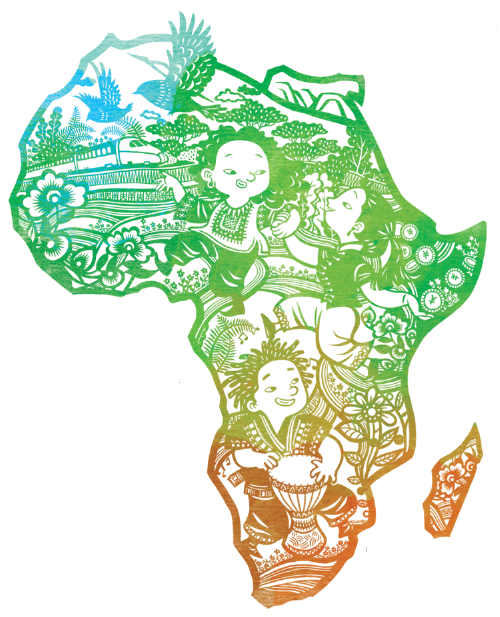Targeted solutions for Africa's food security

Improved mechanisms of the forum mean there is more scope for effective agricultural cooperation between China and Africa
The establishment of the Forum on China-Africa Cooperation in 2000 has boosted political and economic cooperation between China and many African countries. Over the past 20 years, the cooperation mechanism has become full-fledged and stable. Agricultural cooperation between China and African countries has advanced from reaching consensus in the initial stages to comprehensive cooperation with new features.
First, China has improved its trade and investment cooperation with African countries and it is now focusing on improving the self-development capabilities of African countries and showcasing its advantages in agricultural technologies for more targeted cooperation. The rapid growth of investment and trade has driven agricultural modernization in Africa and greatly helped address the continent's food security issue.
China has exempted tariffs on 97 percent of exports from 33 least developed African countries. Between 2000 and 2018, China-Africa trade in agricultural products rose from $650 million to $6.92 billion, up 14 percent year-on-year as Chinese companies have continually increased their investment in African agriculture.
By the end of 2018, around 115 agricultural projects among two-thirds of the African countries had each attracted more than 5 million yuan ($744,700) from Chinese companies.
Second, the participants have expanded from the governments of the two sides to other entities through various channels. China has donated $80 million to the Food and Agriculture Organization of the United Nations to establish the South-South Cooperation Trust Fund and worked with the World Bank to carry out agricultural development cooperation with Ethiopia, Senegal and Mozambique. Through such professional cooperation, China's agricultural technologies and funds are promoting agricultural production in Africa. China has also strengthened its cooperation with Africa's regional organizations, especially the African Union.
Third, the cooperation has extended from crop production to the entire agricultural value chain. The steady development of China-Africa agricultural trade has made China a major market for African agricultural products, especially after China increased its import quotas and reduced or exempted tariffs on many products.
China-Africa trade in cash crops has seen steady growth. Tobacco from Zimbabwe, Mozambique and the Republic of Malawi, and cotton from Zambia and Mozambique occupy a large share in China's market.
Fourth, some China-Africa projects are easy to implement and monitor as they have clear goals. However, others lack systematic integration, which calls for consultations or negotiations to reach consensus. The FOCAC mechanisms can effectively help integrate agricultural cooperation projects.
Nonetheless, many other challenges remain.
First, cooperation on response mechanisms for agricultural emergencies and natural disasters is still inadequate. Compared with other industries, agriculture is more susceptible to sudden and unpredictable risks such as natural disasters, diseases and pests.
African countries' weak ability to cope with emergencies was in evidence in the first half of 2020 when many countries in East Africa were hit by plagues of locusts along with the novel coronavirus. The Chinese government and non-governmental organizations have provided medical assistance to more than 50 African countries and sent food to more than a dozen African countries affected by the locust plagues and the pandemic under multilateral and bilateral cooperation mechanisms focusing on post-emergency relief.
Second, the cooperation focuses on common agricultural development problems faced by African countries while lacking specific measures for different countries. The FOCAC's follow-up agricultural cooperation plans are also aimed at addressing common problems such as the low utilization rate of high-quality seeds, insufficient input into production supplies such as fertilizers and pesticides, low irrigation rate of agricultural land and low-level agricultural products' processing, logistics and storage services. However, food security issues are not uniform across African countries and regions, underlining the need for targeted solutions.
Third, China-Africa agricultural cooperation still focuses on promoting agricultural technologies. More attention should be focused on improving agricultural governance capabilities in African countries as infrastructure such as roads and electricity facilities are scarce in rural areas and African farmers have to raise funds by themselves given inadequate governmental investment in rural development. Although many African countries have formulated agricultural subsidy policies, weak governance capabilities have led to their failure. The countries still need to flesh out institutions and public service systems and improve support for rural households.
Last but not least, Chinese experts' Africa-related studies have mainly focused on macropolitics, the economy and the international relations of African countries; not so much on local, rural and community governance, which directly affect African agricultural development. The lack of understanding about operation and management mechanisms or the culture in rural areas of African countries has made it difficult for many Chinese experts and technicians to promote agricultural technologies.
Thanks to the improvement in the FOCAC mechanisms, there is better scope for China-Africa agricultural cooperation in the future. Besides improving agricultural technologies in Africa, related departments in China need to focus more on enhancing the agricultural governance capabilities in African countries, sharing China's rural development experience with the countries based on actual conditions of the latter and promoting cooperation with African agricultural universities, scientific research institutions and agricultural enterprises. The FOCAC can help establish a China-Africa agricultural emergency cooperation fund to help African countries quickly cope with natural disasters and diseases and improve the capability of the countries to address emergencies through more diverse approaches. It could also help enhance research on agricultural development in African sub-regions and key countries such as Ethiopia, Tanzania, Nigeria and South Africa where agriculture plays a leading role in the economy and launch more targeted cooperation.
The authors are professors at the College of International Development and the Global Agriculture and College of Humanities and Development at China Agricultural University. The authors contributed this article to China Watch, a think tank powered by China Daily. The views do not necessarily reflect those of China Daily.






















